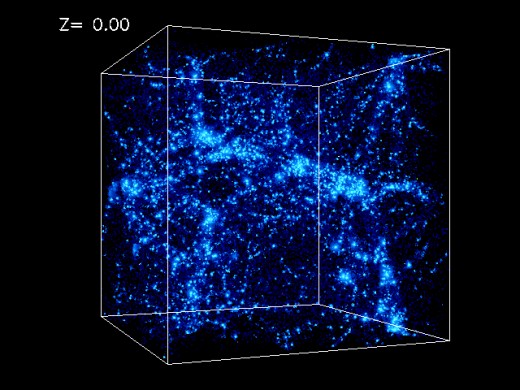Simulated universe theory, your thoughts?

What do you guys think about the simulated universe theory, almost like the matrix in a way. Google the simulated universe theory and tell me what you think. I find it plausible that we are living in a simulation and our 'simulators' are also living within a simulation, etc. almost like simula-inception. what's your opinion on this 'Matrix' theory?Ohhh I've been pondering on the question "How do I know I exist?"
I'm glad you mentioned this theory- I had no idea about it. I feel like we do live in a simulated environment...because I don't know how to convince myself that we don't. I see Mark says something about this.. but I don't know if self awareness + our ability to use logic is really enough.
I mean.. I haven't taken a course in logic, and know little about it.. but weren't humans the one to come up with the principles of validity? Isn't this something we just manifest with our mind? I truly feel like I just make up my reality and the way others perceive their reality influences mine. My mind is so altered by experiences and societal paradigms..Wow, I showed up late to the party! Here's my two cents worth, anyhow:
It is correct that it is impossible to develop any system of looking at 'reality' without making some assumptions. For example, your point that there would be no way of knowing for certain that your senses weren't being deceived in some way to create the illusion of reality as you experience it is a good starting point. This can be generalized to include even the logic we use to make sense of 'reality.' I suppose that might be what you are saying by 'humans [came] up with the principles of validity.' Logicians have worked for literally centuries to refine the definition of what we consider to be 'logical.' However, it is conceivable that a universe could be simulated such that these rules either did not exist or were perceived by Humankind in a way that differed from 'reality.'
I recommend reading the book "Gödel, Escher, Bach: An Eternal Golden Braid" by Douglas Hofstedter. Or, maybe just reading parts of it since it can be VERY dense reading at times, but it is truly a fascinating read. He notes in the book that in order to be able to analyze a system, you must first have a system to analyze the system. You can go on infinitely proposing systems and meta-systems and meta-meta-systems and not really get anywhere. Imagine if, in the movie The Matrix, the Real World had been just another simulation by the machines (this would actually help to explain how Neo somehow gets these magical powers in the Real World at the end of the 3rd movie in the trilogy...).
I said all that to say this: Theories about simulated universes are fun to think about, but are inherently unverifiable. Ultimately, we try to make our assumptions about reality match up with what we perceive and experience and then make changes or perform investigation wherever it doesn't. The simulated universe theory is ultimately inconsequential to humankind at this point since it can't be verified and, by definition, any effects of a simulated universe would be indistinguishable from a non-simulated universe to its inhabitants unless they find a way to exit the universe. The same problems exist for theologists...
That's an awful lot for 2 cents worth, but what can I say? I give more bang for the buck!
Its a really difficult topic to argue because it cannot be proven either way.
It is entirely possible that we live in a matrix, consider how our minds can create dream worlds when we are asleep, if a computer designed by another civilisation could do the same thing then we could be living inside that and never know.
That would also bring into question free will, we imagine ourselves as free beings and to comprehend that we arn't isn't an easy thought, however if we did live in a matrix esque enviroment then could this computer really create free will?
I wrote an essay on the topic a while back on one of my other blogs when I was doing A-Level philosophy ( I would put it on hubpages however that would be copying content ). Here it is
). Here it is
Everything we do in our lives assumes existence, we assume that we are real, we assume everything around us is real, however is it?? are we real and do we exist, interesting question since and abit like the free will question since it is something that we always assume however logically has not reason to help back it up.
Firstly lets start of thinking about whether the world is actually how we see it, if our senses and knowledge of the world is false in some ways then surely it could wrong in others also. For example the colours we see, we only see the colours that are reflected from an object, and thus isn't everything actually every colour but the one we see. Thus the whole idea of colours and them being aesthetically pleasing is one that we have created in our minds. Also there are things we cannot see yet are argued to exist in physics, extra dimensions arn't visible to us however are needed for the world to make sense. In conclusion many things are hidden from us yet are known to exist and/or are different to what we percieve. So how unbelieveable is the idea that existence is also false.
Also what proof is there that we actually exist. This is a slightly irritating part to answer as it deteriorates into any answer being responded to with "prove it" and it is impossible to do so since existence if our idea of existence is wrong then could this "proof" also be wrong. There are many, many explanations on how we may not exist, there are the idea's such as the infamous Matrix computer generated universe, this idea is one that is forwarded by Nick Bostrom from Oxford University (http://www.simulation-argument.com/). You can't disprove this arguement once again due to the arch demon example of a being more intelligent then ourselves constantly being one step ahead. When you think about it, living in a simulation of a world when we are just computer programs isn't unthinkable from the advances in computer technologies we see that one day we will be able to build programs with real AI. A simulation would also explain de ja vu as "glitches in the system" where memory is assigned to the wrong place at the wrong time. Also if you are going to be statistical and arsey then the number of people in these virtual worlds could vastly outnumber real people and thus it is likely that we are in a simulation. This argument however whilst you are unable to disprove it you can question the possibility of it, firstly why would you allow people to question their reality if you wrote the program that was created to control their reality. Also this argument assumes some existence to create the simulation, and thus something must be real.
Another arguement against our existence is, are we dreaming?? in our dreams it seems like reality at the time, no matter how strange (forget lucid dreaming for a second) it is in the dream, thus there is no reason for us to assume we arn't currently in one long dream, possibly one that only ends on death (thus an afterlife), this ends up sounding brilliantly like inception (movies do really seem to like this topic), a dream in a dream, where time is slowed down to the extent where you can spend a lifetime in a dream and not know and/or forget about the outside world. I personally like the idea of this because it avoids the need for god but also allows you almost infinite life .
.
In conclusion do we exist or not, a question that will exist for as long as we exist (or do we ), its a classical unanswerable philosophy question and one that assumes you to believe nothing as true. However the realistical question related to this is does it really matter if we exist or not, this is all we know and probably all we will know and thus shouldn't we make the most of it.
), its a classical unanswerable philosophy question and one that assumes you to believe nothing as true. However the realistical question related to this is does it really matter if we exist or not, this is all we know and probably all we will know and thus shouldn't we make the most of it. Makes no difference. If we have self awareness and the ability to reason then we exist. We can only focus on that which we can understand and control. If there is an external force that can change all the rules as easily as we re-programe a computer there is nothing we can do about it so no point concerning ourselves with it.
Related Discussions
- 16
Would Reality Exist If There Was No One To Observe It?
by PhoenixV 7 years ago
Would Reality Exist If There Was No One To Observe It?
- 101
Does Logic exist without sentience? If sentience is gone will it stay?
by DK 12 years ago
Following a debate with AKA Winston on his forum "If you subtract mankind from existence, what is left?" http://hubpages.com/forum/topic/89816It is clear that the question is not as obvious as it may first appear.My argument is as follows: All sentience created logics will be gone alno...
- 55
Do you think any kind of afterlife exists?
by Terry Harman 9 years ago
Do you think any kind of afterlife exists?
- 235
Why do atheist and other none believers not accept as proof human existence Inc
by Kiss andTales 8 years ago
Why do atheist and other none believers not accept as proof human existenceIncluding them ?I ask this question because atheist are persistent with this line prove that God existBut as they are given proof they persist to say the same words, example a husband and wife claims to love one...
- 415
If you subtract mankind from the universe, what is left?
by AKA Winston 12 years ago
I have heard all sorts of arguments about existence, how the laws of logic exist, how morality exists, how love exists, and so on. I have tried to challenge these assumptions with the object/concept explanation, but that seems to be either too simple or too difficult to accept for many -...
- 472
How do you know God exists ....?
by Thom Carnes 14 years ago
A few weeks ago I asked what I thought was quite a serious, searching question about the existence of God, and was rather disappointed when it got a very limited response. (This could have been because we were all wrestling this other equally important issues at the time.)Peter Lopez made a valiant...











